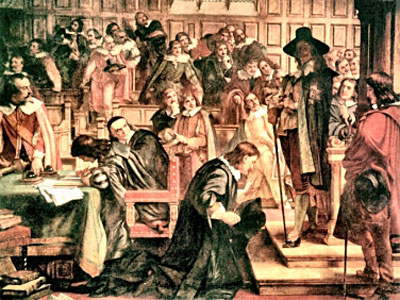Hampden’s legal case against Ship Money was based on the contention that the assessment process was illegal and unprecedented because it was carried out by the county sheriff’s and not by the commissioners as in the past. The case was seen as high profile way of testing the legality of the demands being made and not a refusal to pay the tax per se.
Hampden’s lead lawyer, Oliver St John, accepted the principle of the extension of ship money to inland counties since the King’s judges had already twice ruled unanimously that this was legal. St John argued that because Ship Money was a tax that its rate and apportionment required parliamentary consent. Five of the 12 judges trying the case in the Court of King’s Bench agreed with St John but the other seven found in the King’s favour.
The Ship Money Tax was declared illegal at the beginning of the Long Parliament and the outstanding uncollected amounts were never collected. It is unclear if John Hampden ever paid his 20 shillings.













